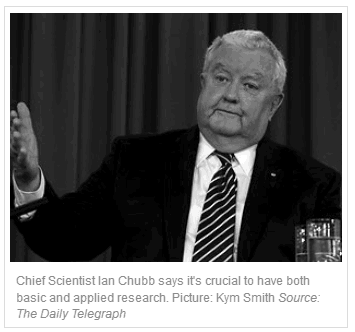
|
News & Views item - August 2012 |
![]() Australia's Chief Scientist Explains to the Attorney-General's Department
Science's Value and Tells Science Industry Association CEOs Not to
Undermine Basic Research. (August 24, 2012)
Australia's Chief Scientist Explains to the Attorney-General's Department
Science's Value and Tells Science Industry Association CEOs Not to
Undermine Basic Research. (August 24, 2012)
Last Friday afternoon Australia's Chief Scientist, Professor Ian Chubb, fronted the bureaucrats of the Attorney-Generals Department -- Nicola Roxon is the current minister -- where undertaking science and furthering the rule of law have much in common:
Fact-finding in science, and in courts, is an attempt to make findings based on the weight of evidence.
Both lawyers and scientists develop theories to explain or interpret the evidence.
Lawyers apply precedents and statutes, scientists apply data and peer review to their evidence.
Just as the reputation of a scientist or journal holds weight, so too does the reputation of a lawyer.
Professor Chubb went on to tell his audience:
...science is crucial to policy development. It is relevant to almost every decision we make, it is a process by which the best decisions can be made, and it is inherently international. Good science is subjected to the critique and criticism of peers with expertise. To stand, it has to pass the test.
There are two ways to integrate scientific advice with policy. The first is to seek expert advice Ė to give an overview of where the best evidence or where the weight of evidence currently lies. This is the sort of advice my Office provides. The other is to engage scientists to conduct research to help produce the evidence to underpin the best policy... [but] solutions need to be based not only on sound science, but on sound politics as well.
To me, science is essential to policy because it is a human endeavour, and because the very reason it exists is to serve and advance humanity. And isnít that what good policy should do too?
I mentioned earlier, the efforts in the US and the UK to incorporate science into policy. One of the greatest challenges for government is to recognise that science should not just be there when they ask for it, and is otherwise irrelevant. If science speaks only when spoken to, it risks being ignored and under-appreciated.
The engagement of science in policy is crucial. My office has already worked with the Attorney Generalís Department on a few topics and I strongly encourage this relationship and to consider scienceís role in the decisions you make, that is what I am here for after all.
_________________________________________
Last night Professor Chubb addressed the Science Industry Association CEOs and took the opportunity to discuss the report of the non-government members of the Prime Minister's Manufacturing Taskforce, "Smarter Manufacturing for a Smarter Australia'' and in particular the need for "a large-scale reprioritisation of resourcing and effort to unleash the power of market pull" which turns out to be a call for reallocating a significant portion of research funding from fundamental research at universities to applied research.
Professor Chubb, who was vice-chancellor of ANU before downsizing his responsibilities by taking up Senator Kim Carr's offer to replace Penny Sackett as Chief Scientist, pointed out to the Science Industry Association CEOs that the proportion of universities' expenditure on R&D on basic and strategic research had declined from 64% in1992 to 45% in 2009 and as Jill Rowbotham reports in The Australian "had also dropped in Commonwealth public research organisations, private non-profits and Australia as a whole."
The Chief Scientist said Australia needs "curious people who ask: why is it like that? And set out to discover the answer'' as well as "people who will define a value by a practical outcome or a process that creates new value for customers. Our real problem in Australia -- and we are not alone -- is that we don't get right, or get right on the right scale, the means by which the people who create knowledge engage easily with the people who will use it.''
In his view the real issue is that it is "ever more important that we work to minimise barriers between the creation of knowledge and its application".
He is, however, disturbed that although our universities produced: "well-trained, well-educated and knowledgeable graduates in a broad range of disciplines, and our research performance is OK [we Australians] have lost or be losing our connection with science, [for example a recent study of students showed] a perverse indifference to science."
While Professor Chubb noted that in his view it was essential to obtain a significantly improved rapprochement between "the researchers and their discoveries and the...researchers applying that knowledge or using it to add value to a product or a process to goods and services [so that]we would understand and encourage both invention...and innovation'', he did not produce a "roadmap" to follow and that is just exactly what one of the jobs his office should be doing through the Prime Minister's Science, Engineering and Innovation Council (PMSEIC).